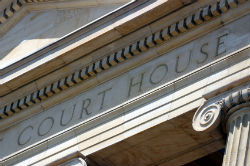The law gives people who file bankruptcy protection from creditors both during and after bankruptcy. A notice is sent to all creditors notifying them of the bankruptcy filing and warns the creditors not to take certain actions to try to collect the debt. Another notice is sent to creditors after the bankruptcy is over notifying creditors that a discharge order was issued, which means all debts were discharged unless the bankruptcy code makes it nondischargeable. What happens when creditors try to collect anyway? The person filing bankruptcy may be awarded damages, including attorney’s fees, emotional distress, and other allowable damages. In cases of serious creditor misconduct, the court may also impose punitive damages. The allowable damages and the procedures for seeking damages depend on whether the bankruptcy case is active or has discharged.

(707) 543-8530
FREE INITIAL CONSULTATION

Bankruptcy Attorney Thomas Jeffrey
Although most people think student loans can never be discharged, that is not always true. First, if the loan isn’t the type of student loan defined in the Bankruptcy Code, it is dischargeable the same as any other loan. Second, even if it is the defined type of student loan, it is still dischargeable if the person qualifies for a hardship discharge.
Three Types of Student Loan Debts
The Bankruptcy Code defines the type of student loan debts that may not be dischargeable. There are three types within the definition: (1) an overpayment of an educational benefit, scholarship or stipend; (2) a loan made, insured or guaranteed by a governmental unit or made under any program funded in whole or in part by a governmental unit or nonprofit institution; and (3) any “qualified education loan”. The first two don’t need a lot of explanation but a “qualified education loan” does. That is defined in the tax code and means a debt incurred solely to pay certain higher education expenses of the person filing bankruptcy, their spouse or dependents, and includes debts incurred to refinance a qualified education loan. However, a loan from a relative or company controlled by a relative is excluded, meaning it is fully dischargeable. A simple way to determine if it’s a “qualified education loan” is to look at whether the interest on the loan is deductible for income taxes. If it is, it’s a “qualified education loan”. If not, it isn’t. Also, the actual use of the loan funds doesn’t matter. If the purpose of the loan was to finance education, the fact the funds were used for something else doesn’t matter. Any loan or debt that is not included in the definition described in this paragraph is dischargeable the same as any other loan.
I get a lot of calls from clients in and around Sonoma County, California, about stopping wage garnishment. If the client is a good bankruptcy candidate, that makes it easy because filing the bankruptcy automatically stops the garnishment. It’s important for your attorney to give notice to the Sonoma County sheriff, employer and the creditor as soon as the bankruptcy is filed or money withheld by the employer may be sent to the creditor if they don’t know about it. The sheriff should release any funds it holds back to the person who filed bankruptcy, but money already sent to the creditor won’t be refunded unless there is a basis for recovering it.
Many people believe that student loans cannot be discharged (eliminated) in bankruptcy but that is not accurate. Student loans can be discharged if there would be an “undue hardship” on the person if not discharged. Under court opinions, that means the person could not maintain a “minimal standard of living” if loan payments were made and the financial situation is unlikely to change. “Minimal standard of living” means the person has to be able to pay essentials such as rent, food, utilities and similar items. Although it’s technically not required, courts are likely to find this for a person who is permanently disabled or is suffering from a medical condition that’s not likely to improve in the foreseeable future. A final requirement is that the person have made a “good faith” effort to repay the loan. If a student loan has only recently been obtained or if there is no history of loan payments having been made the loan is not going to be dischargeable.
It is very common after bankruptcy to have some creditors make errors in their reports to credit bureaus. That’s true of both chapter 7 and chapter 13. That usually seems to happen because of an unintended error but not always. There are businesses that actually specialize in purchasing debt that is known to have been discharged in bankruptcy. Why would they purchase debt that is legally unenforceable? Because the purchaser then reports the account to the credit bureaus as being owed and waits to try to collect it. When real estate was at its peak and people were refinancing at record levels, it was not unusual to have an account reported as owed which had been discharged in bankruptcy. Since removing the account from the credit report takes over a month, many people simply had the account paid at closing.
OFFERING DEBT RELIEF SOLUTIONS & GUIDANCE
OVERVIEW | CHAPTER 7 | CHAPTER 13 | DEBT COLLECTION DEFENSE | FAQs | BLOG | CONTACT


